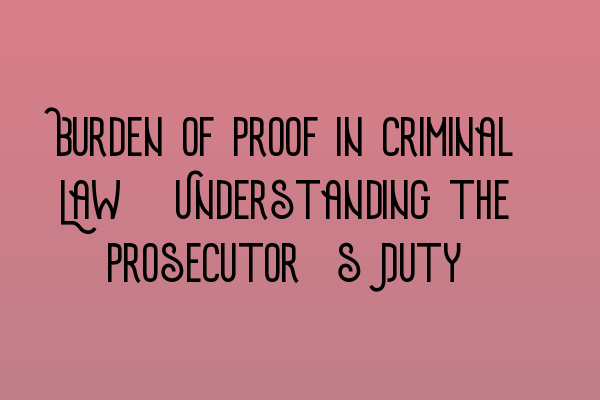Burden of Proof in Criminal Law: Understanding the Prosecutor’s Duty
In criminal law, the burden of proof lies with the prosecutor. This means that it is the prosecutor’s responsibility to prove beyond a reasonable doubt that the accused is guilty. The burden of proof is a fundamental principle of criminal law and is crucial to ensuring a fair trial.
The Standard of Proof
The standard of proof in criminal cases is “beyond a reasonable doubt.” This is a high standard that requires the prosecutor to present evidence and arguments that leave no reasonable doubt in the minds of the jury or judge about the guilt of the accused. The phrase “beyond a reasonable doubt” is often used in courtrooms and is meant to convey the level of certainty required.
To establish guilt beyond a reasonable doubt, the prosecutor must present credible evidence that is sufficient to convince the trier of fact (the jury or judge) that the accused is guilty. This evidence can include witness testimony, physical evidence, documents, and expert opinions.
The Prosecutor’s Duty
The prosecutor has a duty to act fairly and ethically in presenting evidence and arguments. They must disclose all relevant evidence to the defense and cannot withhold or manipulate evidence to secure a conviction. This duty stems from the prosecutor’s role as a representative of justice, rather than an advocate for a specific outcome.
To fulfill their duty, prosecutors must conduct a thorough investigation, gather all available evidence, and present it in a clear and coherent manner. They must also anticipate and respond to challenges from the defense and ensure that the accused’s rights are protected throughout the trial process.
A Fair Trial
The burden of proof in criminal law is essential to ensuring a fair trial. It places the responsibility on the prosecution to present a strong case and protects the rights of the accused. Without this burden, the accused could be at risk of being wrongfully convicted based on flimsy or incomplete evidence.
Understanding the burden of proof is important for both prosecutors and defense attorneys. It helps guide their strategies and arguments throughout the trial. Prosecutors must meet the burden of proof, while defense attorneys must challenge the prosecution’s case and highlight any reasonable doubt.
Conclusion
The burden of proof in criminal law rests with the prosecutor. They must prove beyond a reasonable doubt that the accused is guilty. This high standard requires the presentation of credible evidence and arguments. Prosecutors have a duty to act ethically and fairly in fulfilling their role. Understanding the burden of proof is crucial to ensuring a fair trial and protecting the rights of the accused.
If you found this article helpful, you may also be interested in:
